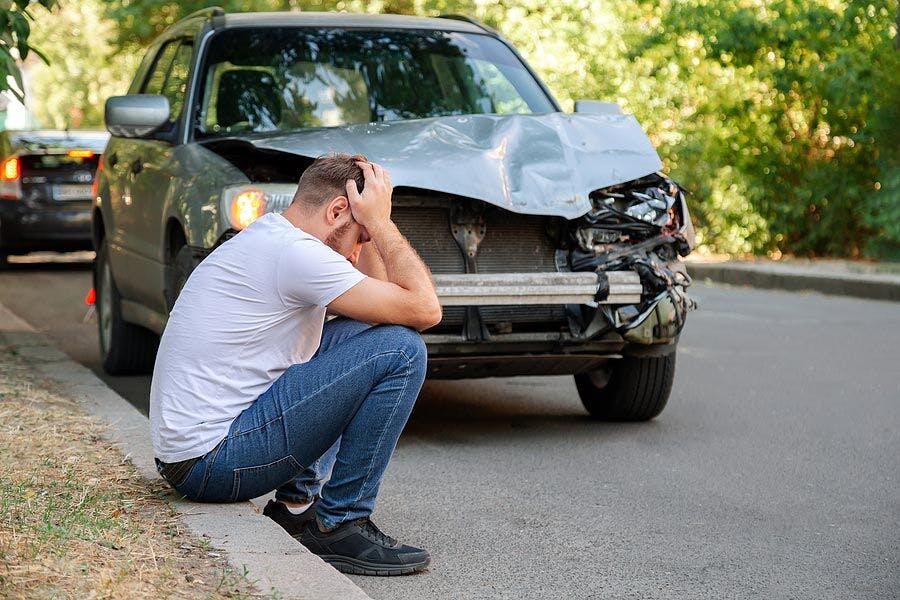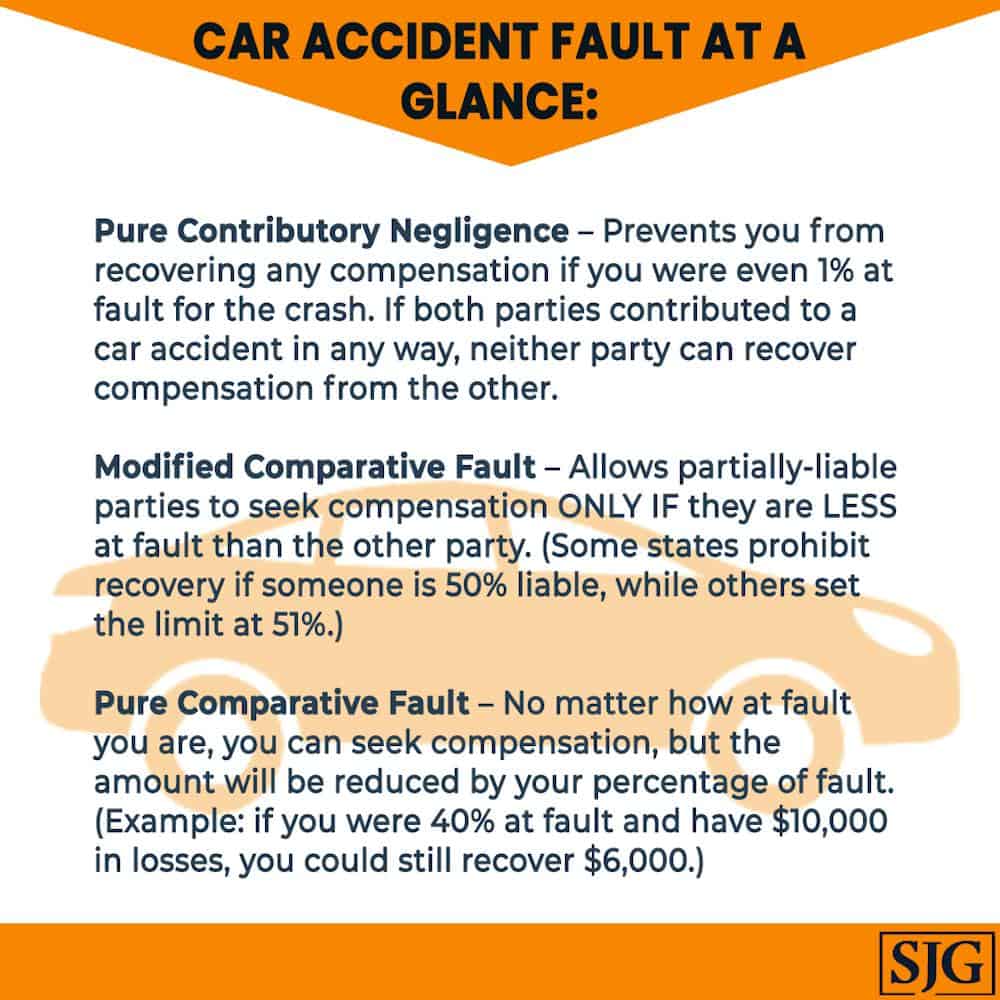
When you’re involved in a car accident someone else caused, you already know the spiel: you may be entitled to seek compensation for medical bills, property damage, and other losses from the insurance company of the at-fault driver.
But what happens if you were the one who caused the crash?
Whether you were looking at your cell phone, speeding, or simply failing to yield as you were supposed to, the guilt and stress can make you feel like you’re drowning.
Fortunately, there still may be a way to recover from your losses.
On this page, we’ll explain it all: what to do after a car accident, insurance coverage options, how fault works in your state, plus when and why to hire an auto accident lawyer.
You may believe car accident lawyers only help people who are innocent victims of car accidents, but there are many ways an attorney can assist you even if you think you’ve caused an accident. It’s always worth discussing the situation with a law firm. Choose one that regularly handles all types of traffic accident cases!
We are a national law firm based in Houston with multiple offices around the country. We also work with affiliate law firms in most states that share our focus and dedication to excellence. No matter where you are located, we may be able to help you, so call or contact us now. We are open, for free, 24 hours a day, seven days a week, or CONTACT US NOW by [CLICKING HERE] to submit your case for review.
What Happens If You Are At Fault In a Car Accident?

If you are at fault in a car accident, you will need to pay for the losses of the other driver, and anyone else injured or harmed in the crash. You would be responsible for paying medical bills and other damages. However, it is important to know that if you are partly to blame for an accident, you might actually be able to collect compensation for your own injuries and damages. To understand your responsibilities and rights, it is important to speak to an experienced car accident lawyer immediately.
What to Do After You Think You Caused a Car Crash
If you think (or know) that you just caused a car accident, stay calm. There are important steps to take after a crash whether or not you were at fault, and you should stay focused to ensure you do—and don’t do—certain things.
1. Never Leave the Scene
First, never under any circumstances should you leave the scene of an accident. Every state has specific laws about stopping after a crash and remaining at the scene. If a driver knows they broke the law or may be subject to other citations or criminal charges, they may be tempted to drive away to avoid the consequences of their actions. However, if you leave the scene of the crash, you could face an arrest and serious criminal charges for a hit and run, in addition to your responsibility for the accident. It is always better to stop in accordance with the law.
In some states, you may also need to render aid to anyone who needs it or call for help. At the very least you should exchange your contact and insurance information with the other driver or drivers involved. If there is a certain amount of property damage or if someone suffered injuries in the accident, you likely have to report it to the authorities.
For example, if you are in a car accident in Houston, under Texas law, you are required to report the collision if it involves injury, death, property damage exceeding $1,000, or property damage that makes a vehicle impossible to drive.
2. Call Law Enforcement
It’s a good idea to call 911 or the police directly so someone can respond to the scene of the accident.
While you wait for the police, keep to yourself as much as possible. In some situations, the other driver may try to confront you or display anger over the crash. Do your best to stay grounded and don’t admit fault or apologize. It can be all too easy to start saying sorry for being distracted or not noticing the other car. This is a mistake, as you should never admit any negligent acts to the other driver. Even if you’re feeling nervous, you should avoid the following:
- Discussing what you were doing prior to the crash
- Talking about who you think was to blame
- Apologizing or making any statements that may indicate you were at fault
- Asking the other driver questions to try to determine whether they made a mistake as well
Stay polite, but keep communications to a minimum. Determine whether anyone is hurt and provide the basic information the driver needs from you, then wait calmly until medical personnel and police arrive. Even if the other driver is acting aggressively, you should never be aggressive or defensive in return.
When the police arrive, stay courteous and give them a basic statement regarding how the accident happened. One of their jobs at the accident scene is to file a police report. To do this, they will ask you questions and examine the damage to your vehicles. While you can say that your car collided with the other car, never add details such as “I was distracted and hit the car.” Avoid admitting why you think you were at fault, since anything you say will be used against you later.
3. Gather Evidence from the Accident Scene
It’s also important to collect evidence at the scene of the accident if you are in good physical condition to do so. In some cases, there may be evidence that you shared the blame with the other driver, which can be extremely valuable.
Follow these steps to begin compiling evidence as soon as the accident occurs:
- Collect names and contact information from everyone involved in the accident
- Collect names and contact information from any witnesses and ask if anyone captured evidence of the crash on their phone
- See if there are any cameras around that may have gotten footage of the accident (dash cams, doorbell cameras, traffic light cameras, surveillance cameras for nearby businesses, etc.)
- Use your smartphone to take pictures of the scene, including all vehicles and damage, debris, road conditions, and other environmental factors
4. Seek Medical Attention
If you have any injuries, seek medical care as soon as you can. It’s important to get the treatment you need in order to minimize the complications and recovery time of your injuries. Medical records also serve as evidence of your injuries and your accident-related expenses.
5. Notify Your Insurance Company5. Notify Your Insurance Company
After you’re stable, it’s important to notify your insurance company of what has happened. We know you’re not looking forward to making this call, but it’s necessary. Don’t make any official statements about how the accident happened, but do let them know that an accident occurred.
6. Contact a Lawyer
Next, contact an experienced car accident lawyer. If a crash was your fault, why would you need a lawyer? Many people ask this question because they don’t know how a lawyer can help them if they are to blame. However, you would be surprised at the many benefits of having a lawyer evaluate your situation and your options. Knowledge is power, and you shouldn’t have to cope with this problem alone!
What if You Were Only Partially at Fault?
What’s the number one reason you should always discuss your accident with a lawyer in-depth? They can let you know if you have a chance at financial recovery. In fact, a law firm can do more than that; they can conduct a professional investigation and review all relevant evidence to determine liability.
Can a partially liable driver still seek recovery? The answer depends on your state’s specific laws.

A lawyer from your jurisdiction can let you know how your state will treat your situation, but the following is a brief overview of various state laws for car accident liability.
Pure Contributory Negligence – This is the harshest of the rules. States that follow the pure contributory negligence rule prohibit someone from recovering any compensation if they were even 1% at fault for the crash. This means that if both parties contributed to a car accident in any way, neither party can recover compensation from the other.
Pure contributory negligence states include:
- Alabama
- District of Columbia
- Maryland
- North Carolina
- Virginia
Pure Comparative Fault – Under these laws, you can seek recovery for partial losses even if you were 99% at fault! Parties who were partially at fault always have the opportunity to file a claim, as long as they were not 100% responsible.
Pure comparative fault states include the following:
- Alaska
- Arizona
- California
- Kentucky
- Louisiana
- Mississippi
- Missouri
- New Mexico
- New York
- Rhode Island
- Washington
Modified Comparative Fault – This is the most common rule. It allows partially liable parties to seek compensation for their losses, but only if they are less at fault than the other party. Some states prohibit recovery if someone is 50% liable, while others set the limit at 51%.
Most states use some type of modified comparative fault, including:
- Arkansas (50%)
- Colorado (50%)
- Connecticut (51%)
- Delaware (51%)
- Florida (50%)
- Georgia (50%)
- Hawaii (51%)
- Idaho (50%)
- Illinois (51%)
- Indiana (51%)
- Iowa (51%)
- Kansas (50%)
- Maine (50%)
- Massachusetts (51%
- Michigan (51%)
- Minnesota (51%)
- Montana (51%)
- Nebraska (50%)
- New Hampshire (51%)
- New Jersey (51%)
- North Dakota (50%)
- Ohio (51%)
- Oklahoma (51%)
- Oregon (51%)
- Pennsylvania (51%)
- South Carolina (51%)
- Tennessee (50%)
- Texas (51%)
- Utah (50%)
- Vermont (51%)
- West Virginia (51%)
- Wisconsin (51%)
- Wyoming (51%)
What does this mean for you? If you live in a pure comparative fault state or a modified comparative fault state, you may be able to take legal action.
Be aware: the fact that you also contributed to the accident will reduce your recovery by your percentage of fault. For instance, if you were 40% at fault and incurred $10,000 in losses, you can still recover $6,000. The insurance company or jury determines the percentage of fault to assign to each driver.
These proportionate liability laws are highly important, as they help drivers who may have acted negligently but who still deserve to recover financially after a crash. A lawyer can explain whether this situation applies to you, and they can help you take the next steps toward recovery.
Your Insurance Coverage
After you caused a car accident, it is important to understand your insurance options fully. Your options will depend on the state you live in and/or where the accident happened.

No-Fault States
There are a handful of states that have no-fault auto insurance laws. This means every driver has their own car insurance, and you must make a claim with your own insurance company whether or not you were at fault.
No-fault coverage should provide benefits for your medical bills and lost wages, whether you were 100% or 0% liable for the crash.
There are eleven no-fault states in the United States:
- Florida
- Hawaii
- Kansas
- Kentucky
- Massachusetts
- Michigan
- Minnesota
- New Jersey
- New York
- North Dakota
- Pennsylvania
- Utah
Fault-based States
In a fault-based state, you will file an insurance claim with at-fault driver’s insurance company. That driver’s insurance policy should provide benefits for an accident victim’s medical expenses and other losses. If the company claims you were also partially to blame, they will certainly use that as a justification to reduce a settlement offer for you, though you may still be able to recover for some of your losses.
Personal Injury Protection (PIP) Insurance
PIP insurance is no-fault coverage required in no-fault states. However, many fault-based states, such as Texas, also require insurance companies to offer PIP coverage for drivers. In fact, if a driver declines this coverage, they must do so in writing.
If you are 100% at fault for a crash (or more than 51% in a modified comparative fault state), your PIP insurance can provide valuable assistance. This coverage will not take your fault into account, and you can seek benefits to pay for medical treatment and reimburse you for lost wages up to your policy limits.
Supplemental Insurance
Other types of supplemental coverage can also come in handy in this situation. This includes emergency coverage such as the policies offered by Aflac and similar companies. You may also have purchased medical payments coverage, known as MedPay. MedPay can help you pay copays and other out-of-pocket expenses for your medical treatment.
Even if you are filing a claim with your own insurance company, stay cautious. Insurance companies are notoriously difficult, even when it comes to helping their own policyholders. It’s wise to have the help of a skilled car accident attorney.
Just because you pay your premiums does not mean your insurer will automatically hand overpayment when you request it, even if your policy covers your claim. You can face the same challenges you would face when filing a claim against another driver’s policy, and you should have the same quality legal representation in this situation.
Any type of car accident scenario can be stressful and can leave you shaken up. The situation can be even more worrisome if you believe you were at fault for the crash. It is important to get the legal support you need and make sure you learn about your rights and all possible opportunities for financial recovery.
Reach out to the skilled legal team of Trust Guss Injury Lawyers now for a free consultation by calling us at 866-942-1377 or visiting our contact page to share your story. We’re here for you 24/7!

★ ★ ★ ★ ★
Back to BlogGet a Free Consultation
 2 minute response
2 minute response 24 hours a day, 7 Days a Week
24 hours a day, 7 Days a Week Dedicated Trust Guss Intake Team
Dedicated Trust Guss Intake Team
"*" indicates required fields

